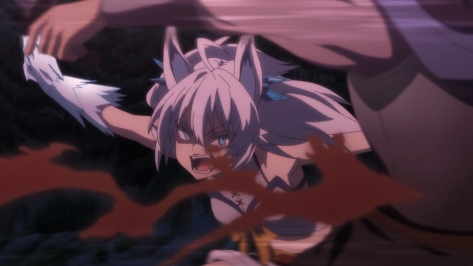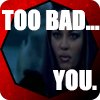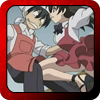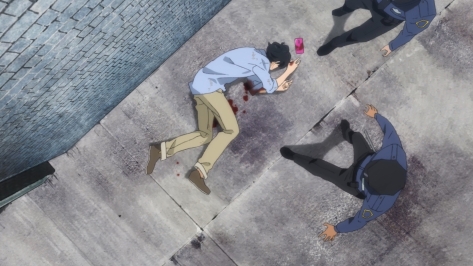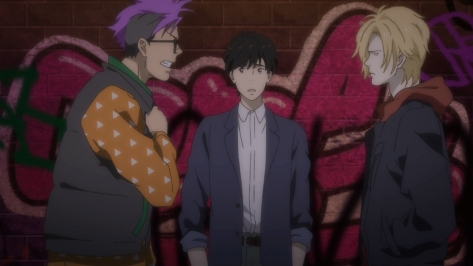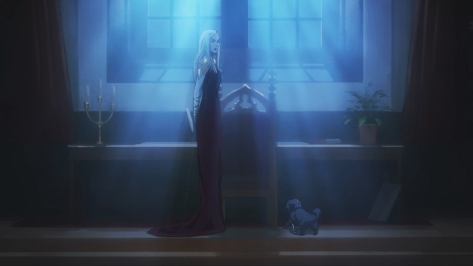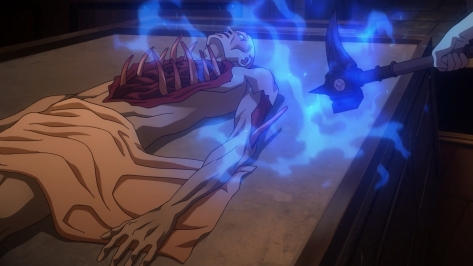Japanese Title: Kaifuku Jutsushi no Yarinaoshi
Similar: The Rising of the Shield Hero
Goblin Slayer
Watched in: Japanese
Genre: Adventure Fantasy Harem
Length: 12 episodes
Positives:
- Nothing
Negatives:
- Everyone is a rapist
- Presents a rapist and sadistic protagonist as the good guy
- Garbage animation and visuals
- Moronic character logic
- Mary-Sue protagonist and deus ex machina every episode
- Bad acting
- Inciting plot makes no sense
(Request an anime for review here.)
Imagine taking The Rising of the Shield Hero and somehow making it ten times worse than it already is. Your result is Redo of Healer. Where to start?
Redo of Healer follows the incomprehensibly stupid story of Keyaru, a healing Hero who somehow gains the ability to time travel. He goes back to before the princess recruited him into her party to heal other Heroes and her powerful allies. Healing someone in this world causes the healer to experience the patient’s mental pain in seconds, so he refused to use his power again. However, the princess couldn’t accept this and locked him in the dungeon, where she turned him into a drug addict, sex slave for anyone in her circle, and torture victim. He would heal in exchange for drugs.
Right, so now that you have the backstory, let me describe what happens after he time travels. He goes back to before the princess recruits him into her party to heal other Heroes and her powerful allies. He accepts the invitation. Healing someone in this world causes the healer to experience the patient’s mental pain in seconds, so he refuses to use his power again. However, the princess doesn’t accept this and locks him in the dungeon, where she turns him into a drug addict, sex slave for anyone in her circle, and torture victim. He heals in exchange for drugs. Am I repeating myself?
That’s correct, he time travels only to choose to go through the same slavery and torture. Now, listen to this galaxy brain explanation. He repeats the same ordeal so that he can somehow absorb people’s memories, talents, and powers with a second of contact via his healing…
Yes, he refuses to do the job for which he’s hired…so that he can be tortured into doing the job…which he needs to do to steal everyone’s minds and abilities. If you can steal with one second of healing, why not go along with the job and steal what you need within a few days? Don’t even need to heal – just shake hands! And to think this stupid is just the first two episodes.
The actual reason for this repeat (apart from the author’s utter incompetence, of course, which we’ll take as a given throughout) is so that you can see what they do to him as a means of justifying all of the depraved things Keyaru will carry out in return, presenting him as some sort of good guy.
After he somehow breaks free of the addiction, he somehow shapeshifts himself to look like a royal guard and for the royal guard to look like him. This gets him close to the princess, after which he rapes and tortures her before changing her face, somehow erasing her memory, giving her a new personality, and having her “willingly” become his sex slave. He sets out with her on a quest to rape and torture everyone who wronged him. Our hero, everybody. And yes, Redo of Healer genuinely tells you that he’s a good guy and you are expected to agree with him.
Next he buys an underage wolf-girl slave, who he somehow strengthens with his semen (I’m not making a joke) and turns her into a sex slave. You may be noticing my overuse of the word “somehow” in this review. That’s because there is no explanation in relation to this guy’s endless powers. He can time travel, heal any injury in a split second (includes full regeneration), steal powers, steal talents, read minds, erase minds, rewrite personalities, shoot magic cream, move so fast it seems like teleportation, resist any poison, display strength beyond anyone, shapeshift himself, shapeshift others, copy any voice, give anyone any voice, perform “alchemy” (it’s nothing like alchemy; they just call it that), make any potion, change his blood into magic, and mind control others, to name a few. He has whatever dumb power the author wants for the idiotic scene we are about to witness.
All of the girls he enslaves, rapes, or tricks throw themselves at him, fulfilling the fantasy of a rape victim falling in love with her rapist. It’s weird to see someone write self-insert fantasy with them as a rapist (of innocent people as well).
Oh god, I just recalled his “genius” strategies. This tries to present them as grand plans you’ll never see coming as he grins like a cocky mastermind, but they’re so obvious that you don’t realise you’re meant to show shock at the big reveal. Redo of Healer so desperately wants to be fantasy Code Geass.
Even if you remove the depravity – let’s suppose they only imprisoned him and forced him to heal, and his heal power just turned deadly instead – it is still a garbage anime. Why would the princess treat the most important person on her team this way? How can she be surprised when he betrays them in the big battle? The antagonists are laughable. They are evil for evil’s sake and like to make others suffer for whatever reason. No depth. With such evil people in charge, the kingdom would have collapsed decades ago.
The harem girls are vapid morons and useless when he can use any power he wants. The dialogue is as well written as this anime’s title. There are also random video game elements – as if the clichés couldn’t stop coming – like RPG stat wheels when he scans someone (another power). This author wanted you to know this series is garbage.
Now that I think about it, what was the point of the time travel? He puts himself through the same thing again, so why bother with the time travel angle. Could just have him learn this corrupted healing out of spite brewing in the dark damp of the dungeon and then he takes his revenge. It isn’t like Erased or Steins;Gate, where knowing the timeline matters to the plot.
Lastly, it goes without saying, but this anime looks and animates terribly, the performances are poor and the only above bottom tier music is the OP and ED, which don’t fit the tone anyway.
I don’t object to Redo of Healer for the depravity or incel-like thinking. There are far more depraved “connoisseur animations & Japan comics” out there for those interested. I don’t advocate banning it either. It’s just shit no matter how you slice this turd.
Overall Quality – Very Low
Recommendation: Avoid it. Redo of Healer is a school shooter’s manifesto.
(Request reviews here. Find out more about the rating system here.)
Awards: (hover over each award to see descriptions; click award for more recipients)
Positive: None
Negative:






